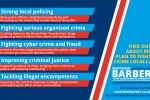
Last month, many of us celebrated Armed Forces day. A few days earlier, and with a little less ceremony, was Reserve Forces Day. The contribution made to Britain’s defence by our reservists is pretty widely recognised. A long way from the days of Dad’s Army, the men and women who serve in the Army, Navy, and RAF reserves are highly trained, highly valued, and often serve alongside their regular comrades in the service of their country. It is right that they are properly appreciated for their service.
Special Constables, on the other hand, do not always seem to get the same recognition. Perhaps because, to many members of the public, they are indistinguishable from regular constables. Uniforms vary from force to force, and it is often hard to distinguish those who give their time as volunteers. The powers that Special Constables have are identical to those of their full-time colleagues, despite a common misconception to the contrary.
Across the country, these unpaid volunteers regularly give up their time to keep their communities safe. Of course, the many hours that they contribute to policing are hugely valuable, but it is wrong for them to be perceived as a way of delivering policing on the cheap. As with many military reservists, these incredible men and women often bring many skills and experiences from outside of policing which they can contribute. In addition to the hours spent on patrol or responding to emergency calls, many of these volunteers may bring with them special skills. It could be IT professionals, who use their work experience to help fight cybercrime, or those from a farming background, who help to tackle rural crime. There seem to be never-ending examples of the talents these incredible people bring to the police forces they serve.
It is about time that politicians at all levels recognised the benefits that Special Constables bring to their communities both in time and skills. Those who serve in the reserve forces are recognised in legislation. Their employers are required to give them time off to perform their duties. They can receive a tax-free bounty to recognise their commitment. By contrast, Specials can get their out of pocket expenses reimbursed.
There is a real opportunity for the next Conservative Government (in addition to significantly increasing investment in regular officers) to properly support the Special Constabulary. Several Conservative-run councils have offered Specials a council tax discount – a measure introduced for Met Specials in 2015 by Boris Johnson – but it is a patchwork and the cost has to be borne by the councils. In a Force such as Thames Valley, there are 16 individual billing authorities that would need to agree on the discount.
HMRC requires that income tax and national insurance are paid on any “bounty” that Specials might receive, unlike their military counterparts. This can have the effect of not only reducing the benefit for the individual, but may also negatively impact other tax-free allowances and taxation thresholds. Many employers are supportive of Special Constables, and recognise the additional skills that they can bring to the workplace, but this is reliant on goodwill.
As a country, we are right to respect the selfless contribution made by our reserve forces. It is only proper that we should do the same for those who give their time, free of charge, to put themselves in harms way to keep the public safe on a daily basis. This is not about turning volunteers into employees or “paying” them for their time. It is about the state acknowledging the commitment they are making.
It would be an incredibly simple change for the Conservative Home Secretary to seek to put Special Constables on the same legal basis as Reservists. A tax-free bounty to recognise the completion of a minimum number of hours, a requirement on employers to accommodate the commitment that Specials make and ensure these amazing men and women get the recognition they deserve.


